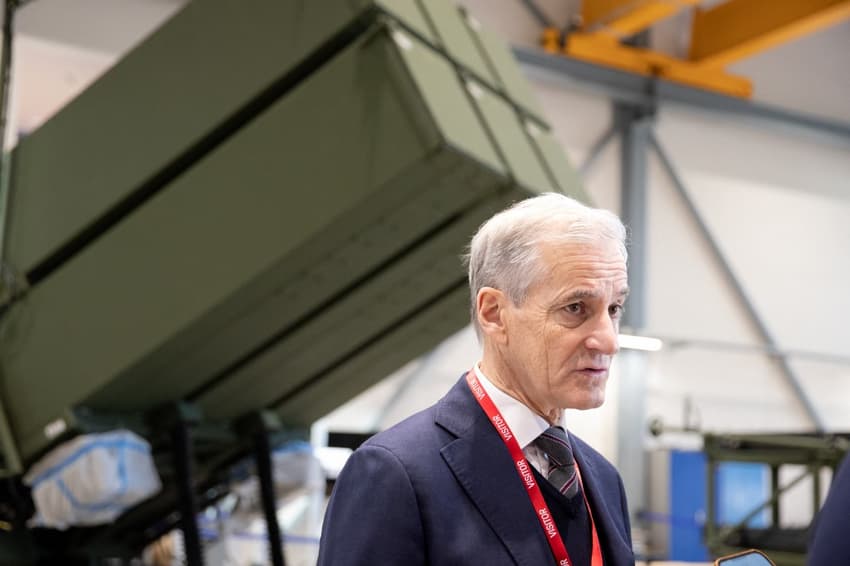Norwegian PM: Norway not a 'war profiteer'

Norway is growing richer by the minute as the conflict in Ukraine boosts its gas revenues, but it is not a "war profiteer", its prime minister told AFP in an interview.
"It's a notion that I flatly refuse", Prime Minister Jonas Gahr Støre said after visiting a liquified natural gas plant near Hammerfest in the Arctic, hinting that Norway would soon become one of the world's biggest donors to Ukraine with an upcoming aid package.
Hinting that Norway would soon become one of the world's biggest donors to Ukraine with an upcoming aid package, Prime Minister Jonas Gahr Støre dismissed the unflattering "war profiteering" allegation made by those who want Oslo to do more for Ukrainians.
"It's a notion that I flatly refuse", Store said Tuesday after visiting a liquified natural gas plant near Hammerfest in the Arctic.
His government is putting the final touches on a "multi-year support package" to be announced in the coming days, designed to help Ukraine and poor countries affected by the knock-on effects of the war, such as soaring grain prices.
The aid will help them "in maintaining their civil infrastructure, hopefully one day rebuilding a free Ukraine and in the meantime also supporting them militarily", he said. The amount and details will be announced "early in February", he said.
Støre rejected the notion, put forward by Poland's prime minister among others, that Oslo was, albeit involuntarily, taking advantage of the war in Ukraine for its own financial gain.
Since last year, the Scandinavian country has redoubled efforts to help compensate the drop in Russian gas supplies to Europe following Moscow's invasion of Ukraine.
Oslo has boosted gas exports by 8 to 10 percent and is now Europe's biggest supplier, helping the continent stay warm this winter. With gas prices high, that means Norway's coffers are overflowing.
This year, the government has forecast its biggest ever budget surplus of 1.12 trillion kroner ($113 billion). That cash will help fuel Norway's sovereign wealth fund, already the world's largest, worth more than 13.4 trillion kroner ($1.34 trillion).
"Norway has for 50 years been an explorer, at some risk, and seller of energy resources, oil and gas", he said. "Norway does not fix those prices".
The higher gas price, he noted, has also led to soaring electricity bills for Norwegian families and companies, which is "politically a big challenge
for us" in a country that relies heavily on electricity, including for its industry, heating and transportation.
Comments
See Also
"It's a notion that I flatly refuse", Prime Minister Jonas Gahr Støre said after visiting a liquified natural gas plant near Hammerfest in the Arctic, hinting that Norway would soon become one of the world's biggest donors to Ukraine with an upcoming aid package.
Hinting that Norway would soon become one of the world's biggest donors to Ukraine with an upcoming aid package, Prime Minister Jonas Gahr Støre dismissed the unflattering "war profiteering" allegation made by those who want Oslo to do more for Ukrainians.
"It's a notion that I flatly refuse", Store said Tuesday after visiting a liquified natural gas plant near Hammerfest in the Arctic.
His government is putting the final touches on a "multi-year support package" to be announced in the coming days, designed to help Ukraine and poor countries affected by the knock-on effects of the war, such as soaring grain prices.
The aid will help them "in maintaining their civil infrastructure, hopefully one day rebuilding a free Ukraine and in the meantime also supporting them militarily", he said. The amount and details will be announced "early in February", he said.
Støre rejected the notion, put forward by Poland's prime minister among others, that Oslo was, albeit involuntarily, taking advantage of the war in Ukraine for its own financial gain.
Since last year, the Scandinavian country has redoubled efforts to help compensate the drop in Russian gas supplies to Europe following Moscow's invasion of Ukraine.
Oslo has boosted gas exports by 8 to 10 percent and is now Europe's biggest supplier, helping the continent stay warm this winter. With gas prices high, that means Norway's coffers are overflowing.
This year, the government has forecast its biggest ever budget surplus of 1.12 trillion kroner ($113 billion). That cash will help fuel Norway's sovereign wealth fund, already the world's largest, worth more than 13.4 trillion kroner ($1.34 trillion).
"Norway has for 50 years been an explorer, at some risk, and seller of energy resources, oil and gas", he said. "Norway does not fix those prices".
The higher gas price, he noted, has also led to soaring electricity bills for Norwegian families and companies, which is "politically a big challenge
for us" in a country that relies heavily on electricity, including for its industry, heating and transportation.
Join the conversation in our comments section below. Share your own views and experience and if you have a question or suggestion for our journalists then email us at [email protected].
Please keep comments civil, constructive and on topic – and make sure to read our terms of use before getting involved.
Please log in here to leave a comment.